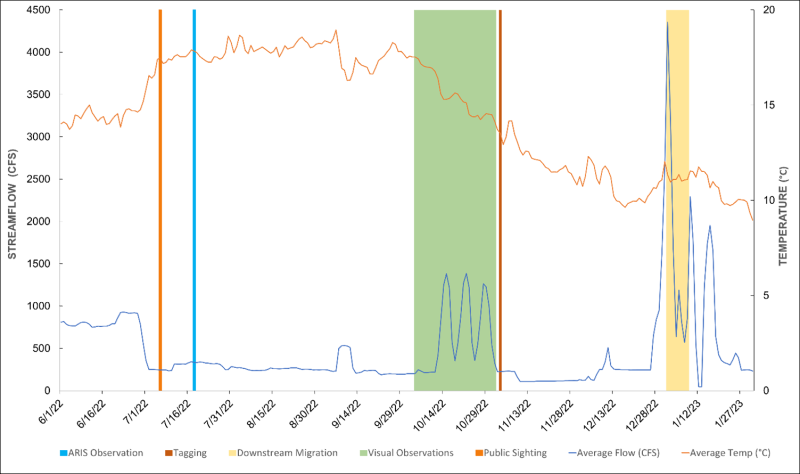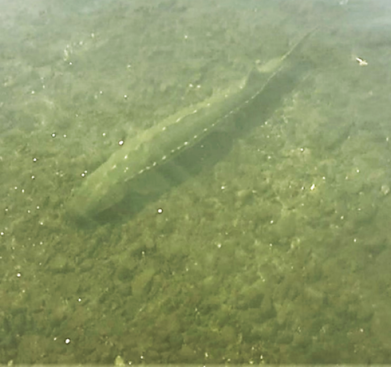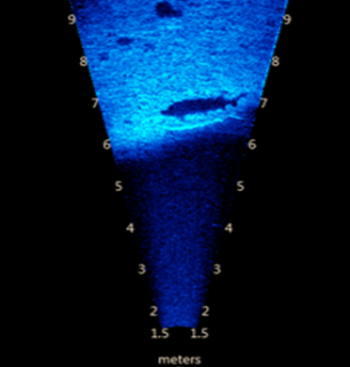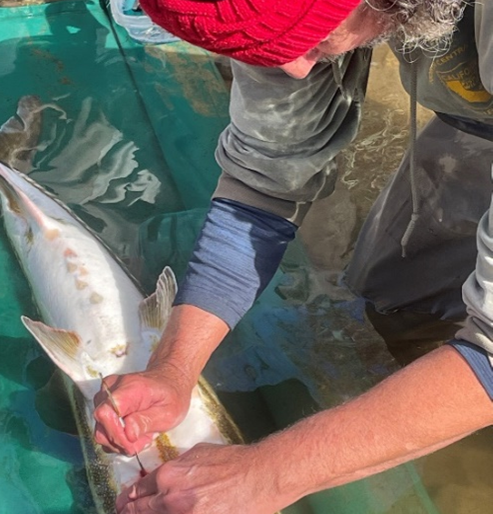Species Status
White Sturgeon (Acipenser transmontanus) and Green Sturgeon (Acipenser medirostris) have been historically known to occupy the San Joaquin River (SJR) watershed. The southern distinct population segment (sDPS) of Green Sturgeon is listed as a threatened species under the Endangered Species Act (ESA). Historical and current studies provide evidence that White Sturgeon are spawning in the San Joaquin River, however information regarding the presence of Green Sturgeon in SJR or its tributaries is limited (Anderson et al 2018). Prior to 2018, there were only unconfirmed angler reports of Green Sturgeon (Dubois and Danos 2017) in the San Joaquin River Basin upstream of Stockton. Since 2018, observations of Green Sturgeon have been made in the San Joaquin River (SJR) basin upstream of the Merced River confluence and in the Stanislaus River near Knights Ferry. Confirming the presence of adult Green Sturgeon in the Stanislaus River emphasizes how crucial it is to better understand the ecological importance of the SJR and its tributaries.
Necessity of Rescue
After receiving a sturgeon sighting report, California Department of Fish and Wildlife (CDFW) drought stressor monitoring staff closely monitored streamflow and water temperatures where the sturgeon was observed (Figure 1). Although the low streamflow and elevated water temperatures caused by unfavorable drought conditions posed a major threat to fish populations inhabiting the other SJR tributaries, hydrologic conditions on the Stanislaus River near this location remained optimal, therefore no rescue or relocation was necessary. CDFW staff continued monitoring the sturgeon in the pool until the species was positively identified in October. The capture and tagging event was performed because the migration and life history data gathered will provide critical information contributing to a further understanding of the status, behavioral, and migration patterns of Green Sturgeon in the SJR basin.
 Figure 1. Temperature (°C) versus streamflow (cfs) at Orange Blossom Bridge on the Stanislaus River. Shaded areas mark different monitoring or migration activities.
(click/tap to enlarge)
Figure 1. Temperature (°C) versus streamflow (cfs) at Orange Blossom Bridge on the Stanislaus River. Shaded areas mark different monitoring or migration activities.
(click/tap to enlarge)
Methods
 Figure 2. Image of sturgeon captured by GoPro.
Figure 2. Image of sturgeon captured by GoPro.
On 6 July 2022 CDFW La Grange staff were notified of a possible sturgeon sighting on the Stanislaus River below Knights Ferry in a deep pool. CDFW confirmed the presence of a sturgeon holding at this location on 18 July 2022 via footage captured by a Go Pro (Figure 2) and by utilizing an ARIS (Adaptive Resolution Imaging Sonar) (Figure 3). Go Pro footage in early October 2022 confirmed the sturgeon to be a Green Sturgeon. Visual sightings were made weekly by La Grange CDFW escapement crews from 4 October 2022 until the tagging event on 3 November 2022. The sturgeon was captured by deploying trammel nets parallel with streamflow. Nets were anchored to the bottom and were checked every twenty minutes. Following the capture, the sturgeon was surgically implanted with an acoustic tag (Vemco V16, 69 kHz) as well as a Passive Integrated Transponder (PIT) tag (Figure 4).
 Figure 3.Sonar image of sturgeon captured with ARIS 1800 Explorer.
Figure 3.Sonar image of sturgeon captured with ARIS 1800 Explorer.
 Figure 4. Surgical implant process.
Figure 4. Surgical implant process.
Results
 Figure 5. Green Sturgeon after surgery prior to release.
Figure 5. Green Sturgeon after surgery prior to release.
CDFW staff successfully captured, tagged, and monitored a Green Sturgeon holding in a pool in the Stanislaus River. Upon capture, the fish appeared to be in healthy condition (Figure 5). The fork length measured 157cm while the total length was 176cm, with a girth behind the pelvic fin of 56cm.
Monitoring
CDFW and United States Fish and Wildlife Services operate and maintain an array of VEMCO 69 kHz acoustic telemetry receivers placed at several fixed locations ranging from the Benicia and Antioch Bridge in the San Francisco Bay, upstream through the main stem of the SJR, and throughout the tributaries (See map, Figure 6). Acoustic receivers were downloaded periodically to detect the presence/absence and migration patterns at upstream and downstream sites to determine the direction of fish movement. The data collected revealed that the sturgeon was detected by a receiver located downstream in the Stanislaus River on 1 January 2023, and continued migrating toward the bay where it was detected at the Antioch Bridge just seven days later. Further monitoring using acoustic telemetry is being conducted to gain a better understanding of the existence and migration patterns of sturgeon within the SJR basin.
 Figure 6. Map of Vemco receiver locations where Green Sturgeon was detected during migration. (click/tap to enlarge)
Figure 6. Map of Vemco receiver locations where Green Sturgeon was detected during migration. (click/tap to enlarge)
Partners
- United States Fish and Wildlife Service
Prepared by:
Alisa Dahl, CDFW
Christopher Diviney, CDFW